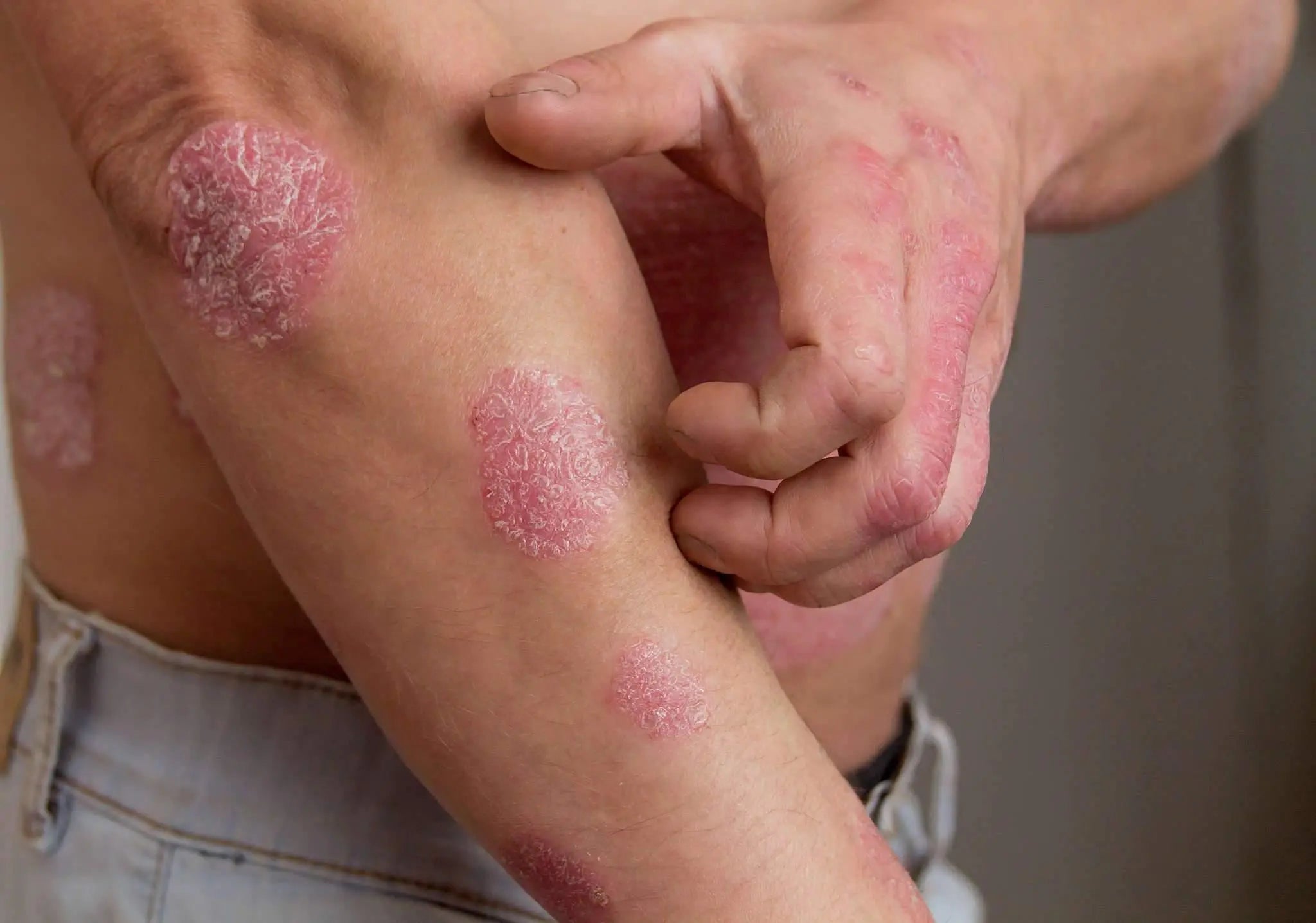Can CBD Help Treat Psoriasis
Introduction
CBD products have gained massive popularity over the past few years. This is mostly due to their beneficial effects on several ailments.
What’s often confusing for people is the mix up of CBD with marijuana. Marijuana is a naturally occurring plant that contains high concentrations of Tetrahydrocannabinol (THC), which is responsible for making you feel “high”. It is referred to as a psychoactive compound in the scientific community.
CBD, on the other hand, is grown from industrial hemp that contains 0.2% of THC or less, thus having no psychogenic effects whatsoever.
There is growing evidence of the efficacy of CBD in the management of numerous medical conditions, and discussing every possible health benefit would be out of the scope of this article.
Instead, we will focus on one medical condition, psoriasis.
Psoriasis
Psoriasis is a chronic dermatological condition characterized by the rapid buildup of skin cells. It is an autoimmune disease with vaguely understood pathophysiology and no curative treatment.
The severity of symptoms varies greatly from one patient to another. Additionally, episodic flare-ups occur in a group of patients, causing some severe symptoms.
The prevalence of psoriasis is extremely high, with one study reporting that 7.4 million Americans are affected.
Normally, skin cells grow in the deeper layers of the skin and then gradually surface until they fall off. This process takes around one month in healthy individuals.
However, in patients who have psoriasis, the entire process takes a few days, preventing the cells from naturally falling off. As a result, patients present with a buildup of skin cells all over their bodies, with some areas being more predilected than others.
There are many other types of psoriasis that affect the nails, mouth, and genitalia; however, they are relatively rare.
Cause of psoriasis
Like all other autoimmune diseases, psoriasis’ pathophysiology is not fully understood; however, the cause of this disease is believed to be a combination of nature and nurture.
The nature part is the genetic predisposition of patients. In other words, if you have a family member with psoriasis, your risk of getting the disease is much higher than the general population.
The nurture part might be an environmental factor that triggers the already-predisposed immune system to launch an immune reaction against skin cells. This could be a viral infection, a toxin, or even a food element.
Unfortunately, psoriasis has no cure. All the available therapeutic modalities aim to reduce inflammation and scales. These include topical corticosteroids, anthralin, methotrexate, and cyclosporine.
As you can see, psoriasis is a real hassle to deal with. This has motivated physicians and scientists to look outside the box for new possible treatment options. One of the proposed treatments is CBD oil and cream, so let’s go through some scientific evidence to see whether CBD oil clears psoriasis or not.
Can CBD oil and cream help with psoriasis?
While no one can argue against the benefits of CBD, the online community is full of misinformation and false claims. Therefore, you should be careful when you read something about a miraculous treatment that cures a chronic disease. Most of the supporters of these claims are only seeking personal profit or desperate enough to believe in anything.
When it comes to psoriasis and CBD, people are always asking questions like: can CBD oil clear psoriasis? Can CBD cream help psoriasis? Which CBD is the most effective for psoriasis?
In order to properly answer these questions, we need to look at a few scientific papers that studied the relationship between psoriasis and CBD.
In a 2007 study, scientists analyzed the effects of CBD on cellular proliferation of keratinocytes (skin cells).
They concluded that “Our results show that cannabinoids inhibit keratinocyte proliferation, and therefore support a potential role for cannabinoids in the treatment of psoriasis.”
The mechanism by which CBD exerts this function is quite complicated and involves the activation of numerous intracellular signaling cascades by binding to the CB1/CB2 receptors (CBD receptors).
These findings were supported by other studies, including a 2019 study that involves 5 participants diagnosed with psoriasis.
Patients applied topical CBD-enriched ointment on affected areas twice a day for three months. By the end of the clinical trial, researchers stated that CBD-use was not only effective in reducing psoriasis symptoms but it also improved their quality of life of patients and showed no adverse effects.
The last point is extremely important! Patients with psoriasis often suffer from mental health issues that were precipitated by their disease.
Like many other dermatological conditions, patients become conscious of their skin. They attempt to hide the rashes and the scales caused by psoriasis and worrying about complications every day. Over time, this lifestyle can become exhausting, and the fact that this disease has no cure will only exacerbate the situation.
This is why patients with severe symptoms should be getting psychological support along with conventional therapy.
Thus far, there are no clinical trials that prove the inefficacy of CBD in treating psoriasis. Nevertheless, some physicians think CBD is inferior to the pharmacological drugs used today, and should not be considered as first-line therapy.
Conclusion
Psoriasis is a chronic medical condition that may reduce the quality of life of affected patients. It could also present with systemic clinical manifestations, such as psoriatic arthritis and reactive depression.
Due to the scarce treatment options and frequent relapses, this disease poses a real challenge for both patients and physicians.
For this reason, scientists started experimenting with new potential treatments. Preferably, the proposed treatment should be non-pharmacological because of the high incidence of side effects, especially with chronic use.
CBD was one of the first suggested options because of its well-known anti-inflammatory properties.
Now if you are thinking about using CBD to treat psoriasis, you should be careful not to abandon conventional therapy. Using CBD as a complementary treatment is a great idea; however, taking it as first-line therapy might not be effective enough, for some, to treat symptoms and prevent episodic flare-ups.


